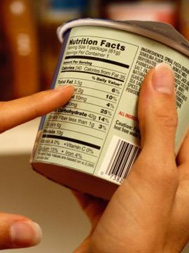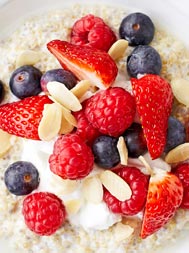| February 2017 | Hotlunch.com | 1-888-376-7136 |
[Volume 9, Issue 2] |
|
|
| |
| Addressing Product Date Label Confusion |
|
|
There are all kinds of labels on the foods you buy. The brand label, the Nutrition Facts label, the ingredients list and any possible health claims may all have a spot on the packaging. And you'll often see a date along the lines of 'best used by' or 'sell by.' Those use by or sell by dates are voluntary and they can be a bit confusing.
Grocery industry launches new initiative to reduce consumer confusion on product date labels
http://www.gmaonline.org/news-events/newsroom/grocery-industry-launches-new
This is from the Grocery Manufacturers Association, a trade organization that represents grocery stores. It describes a new industry effort to reduce confusion about those date labels. The idea is two get the food industry to use one of only two labels: BEST If Used By or USE By.
Why does it matter? The current set of labels makes it difficult to know if the food product is truly out of date and a lot of food gets thrown out that may still be good. |
|
|
|
| |
| Teens Going Hungry In Poorest Families |
|
|
|
In extremely poor families, parents often go without eating so their kids can eat. But if there's still not enough food, then parents often feed the youngest children first, leaving the older children to go hungry.
Teens may go hungry as poorest families struggle to feed kids
https://consumer.healthday.com/public-health-information-30/economic-status
This new story from HealthyDay describes new study findings that tell how parents in extremely poor families figure out which family members to feed. The study team from Johns Hopkins looked at survey information taken from about 1,500 families from Boston, Chicago and San Antonio back between 1999 and 2005.
The researchers found that teens were twice as likely to hungry as their younger siblings. The study team noted the dates of the survey information and said they're concerned that numbers such as those found in the study may actually be worse today. |
|
|
| |
| Parent Weight and Not Baby Weight? |
|
|
It's a common thing to point to pregnancy and having a baby as the time when we gain those extra pounds that stay on our thighs and belly. It's normal and necessary to gain some weight with pregnancy, but is it really the reason for extra pounds? A new study says maybe not.
Parenthood, not leftover pregnancy pounds, may cause weight problems
https://www.washingtonpost.com/national/health-science/parenthood-not-leftover
This news story from The Washington Post describes a new study that looks at the weight women gain around the time they have babies and beyond. For their study, the researchers looked at more than 28,000 women, mostly in their mid-twenties who had at least two babies during an 8-year period.
Before they had babies, the women weighed about 153 pounds (on average) and 168 pounds five years later. Women of the same age who don’t have babies typically weight about 164 pounds at the same age.
The study team found that new moms gained about the same amount of weight per year as non-moms for the first year or two. The extra weight gain started when their babies were three years old. The researchers suggest the weight gain difference may be due to lifestyles of parenthood rather than pregnancy. |
|
|
|
|
| |
| Too Much Soda May Be Bad for Kids' Livers |
|
|
|
Sugary sodas are sweetened with sugar or high fructose corn syrup - both of which add extra calories to a kid's diet and both sweeteners are high in fructose (also called 'fruit sugar'). When fruit sugar is still in fruit, it's not bad because there's plenty of fiber to slow down absorption but lots of good nutrition that goes with the fruit.
However, sugary sodas add no extra nutrition and there’s nothing to slow down the absorption of the glucose and fructose that makes up those sugars. And, fructose in large amounts may not be so good for the liver.
Too much soda may raise children's risk of fatty liver disease
https://www.washingtonpost.com/lifestyle/wellness/a-parental-primer-for-kids
This news story from Medical News Today describes a new study that finds kids who consume large amount of fructose, often from sweetened soft drinks, may be at a greater risk of having a condition called nonalcoholic fatty liver disease. The study team uses their findings on blood levels of uric acid, which rise with intake of fructose, and liver biopsies form kids who have the disorder. About half the kids with fatty liver disease had high uric acid levels compared to about one-quarter of the kids who did not have the disease.
Whats the take home message? Cut back on added-sugar intake. Added sugars are found in sweetened soft drinks, sweet snacks and other foods (read those food labels). Replace those sweetened foods and beverages with whole fresh fruits and berries, instead. |
|
|
| |
| Fruits and Veggies for a Happy Brain |
|
|
I think everybody knows that fruits and vegetables are good for your health because they're loaded with nutrients and fiber, plus they're usually not high in calories. And it makes sense that all those nutrients might be good for your brain health, but how long will it take before you feel better psychologically? Not long at all!
Eating more fruits, vegetables boosts psychological well-being in just 2 weeks
http://www.medicalnewstoday.com/articles/315781.php
This news story from Medical News Today describes a new study that set out to determine just how long it takes to improve your mood after you increase your intake of fruits and vegetables. The study team physically gave young adults extra fruits and veggies for two weeks and found the participants felt a boost in motivation and vitality after just fourteen days.
A couple notes, though. Interestingly, and importantly, the participants who were given the produce felt the improvements. Another group of participants who were given vouchers didn’t feel better. And no improvements were seen in depression or anxiety symptoms.
So the take home? It may not be enough to say ‘eat your veggies.’ We may need to make sure people actually get them. |
|
|
|
| |
About HotLunch.com |
|
|
|
Hotlunch.com is the only web-based system of its kind. Take a look at these testimonials to see how Hotlunch.com made an impact for these schools.
http://hotlunch.com/testimonials.html |
| |
| NEW AND IMPROVED VERSION 2.0! |
-
With Hotlunch.com you can publish lunch menus online, receive payments and automate administration of your Hotlunch at school.
-
Hotlunch.com has been used by schools all over the nation to manage after school care, volunteer recruitment, capital campaigns and much more!
-
Manage multiple schools, nutrition information, reduced fee lunches, inventory and much much more
-
Faster Reports, and easier access, you can be up and running in less than an hour.
- Ask us how today. Call 1-888-376-7136 or email [email protected]
|
|
|
| |
| Like us on Facebook |
|
Hotlunch.com has expanded our online presence to Facebook. The new Hotlunch.com Facebook Page will provide you a wealth of information and updates on School and Children’s nutrition. |
|
 |
|
| |
| ainiti - Empowering underprivileged girls in undeveloped countries |
|
Hotlunch.com is giving back to underprivileged girls
Check out the progress we have made at www.ainiti.org
Please ask us how your school can help, email [email protected] |
|
 |
|
| |
| More About School Lunches, Nutrition and Healthy Kids |
|
| |
Dietary protein - from any source - may help muscle health
http://www.reuters.com/article/us-health-muscle-dietary-protein-idUSKBN15N2TX
Drinking Peroxide as 'Natural' Cure Leads to Dangerous Blood Clots. So-called 'super water' carries big risks, doctors warn
https://consumer.healthday.com/alternative-medicine-information-3/mis-alternative-medicine-news-19/drinking-peroxide-as-natural-cure-leads-to-dangerous-blood-clots-719290.html
Whole-Grain Foods May Help You Stay Slim: Study found switching to more fibrous fare lowered calorie absorption, boosted metabolism rate
https://consumer.healthday.com/vitamins-and-nutrition-information-27/dieting-to-increase-fiber-health-news-194/whole-grain-foods-may-help-you-stay-slim-719475.html
When Counting Calories, Consider the Cream and Sugar: Most calories in coffee and tea come from what's added, researchers say
https://consumer.healthday.com/vitamins-and-nutrition-information-27/caffeine-health-news-89/when-counting-calories-consider-the-cream-and-sugar-719170.html
Preaching to the converted? Only dieters are responsive to healthy eating adverts
http://www.foodnavigator.com/Market-Trends/Preaching-to-the-converted-Only-dieters-are-responsive-to-healthy-eating-adverts |
| |
| About Shereen Lehman |
|
Shereen Lehman is a health and nutrition writer with two decades of experience counseling people on nutrition and diet. She has a master's degree in human nutrition and is a member of the Academy of Nutrition and Dietetics and the Association of Health Care Journalists.
Shereen writes about nutrition for the large website About.com (http://nutrition.about.com), is co-author of Superfoods for Dummies (http://www.wiley.com/WileyCDA/WileyTitle/productCd-0470445394.html) and Clinical Anatomy for Dummies (http://www.wiley.com/WileyCDA/WileyTitle/productCd-1118116437.html). |
| |
|
















